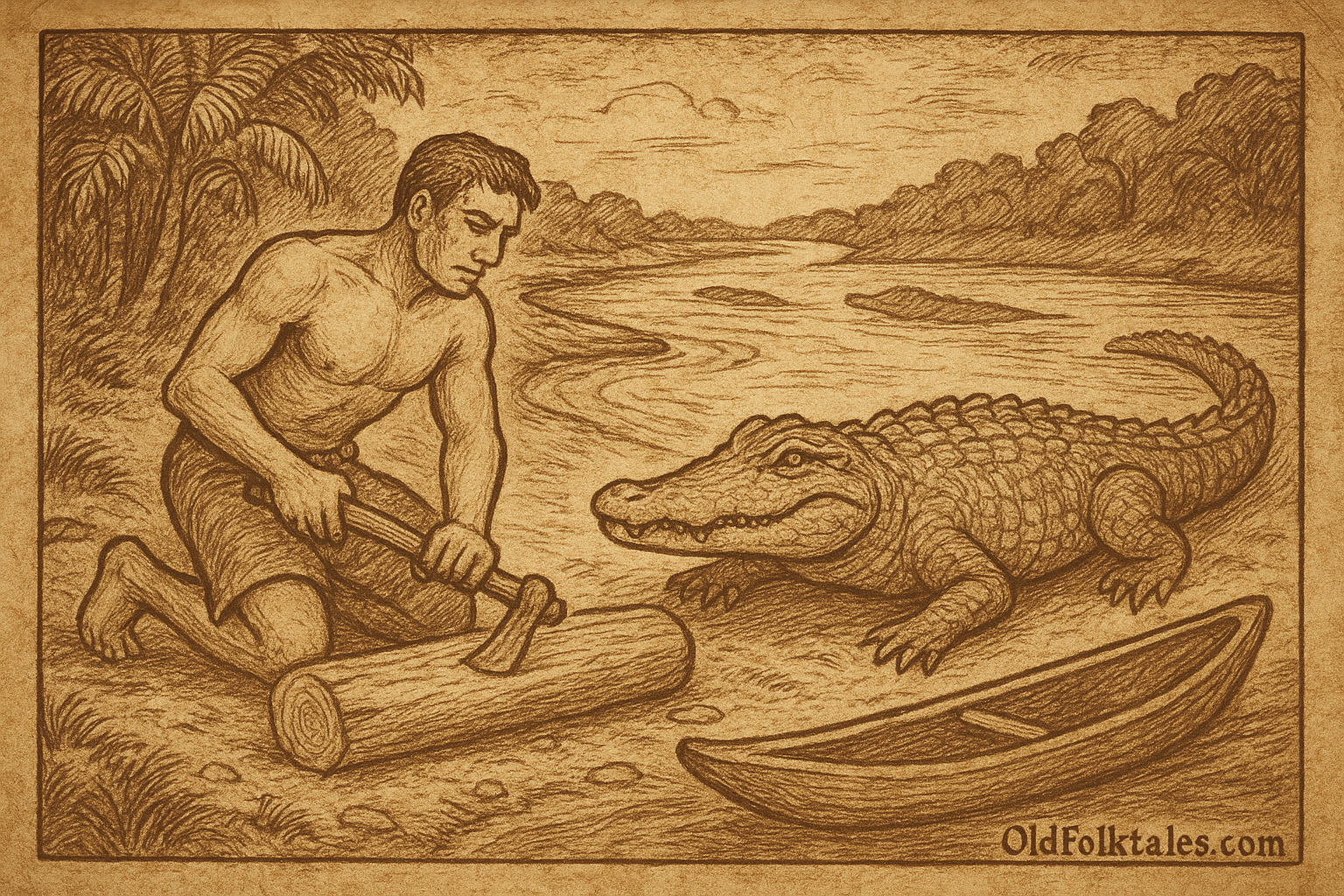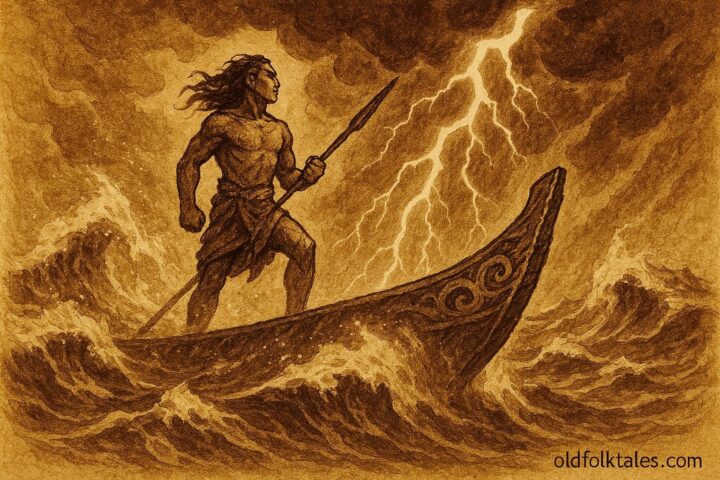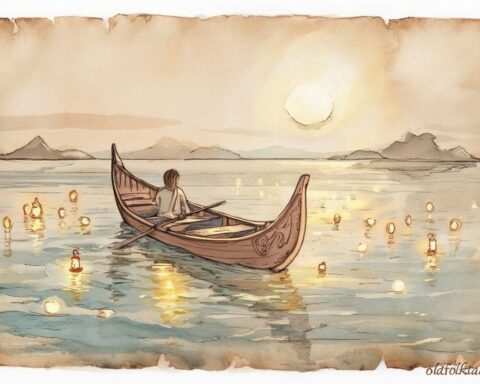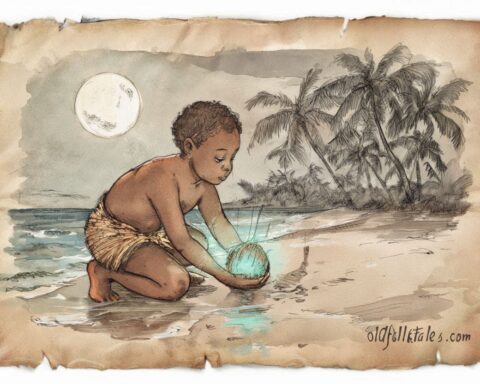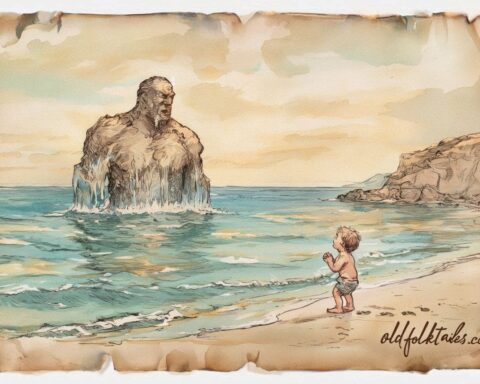In the time when the world was still finding its shape and all creatures were learning their places in creation, humans and crocodiles lived not as enemies, but as brothers. They shared the great Sepik River that wound like a brown serpent through the heart of the land, its waters carrying the stories and spirits of the ancestors in every ripple and eddy.
The river was everything to both peoples. Its muddy banks provided clay for building and creating. Its depths held countless fish that fed the hungry. Its surface served as a highway and meeting place, connecting village to village, family to family. And in those ancient days, humans and crocodiles worked side by side in harmony, each respecting the other’s gifts and strengths.
Click to read all Melanesian Folktales rich oral storytelling from Papua New Guinea, Fiji, Solomon Islands, and Vanuatu
Together they built canoes from the massive trees that grew along the riverbanks, the humans using their clever hands and sharp tools to shape the wood, the crocodiles using their powerful tails to help drag the logs to the water’s edge. Together they fished, the humans casting nets while the crocodiles drove fish toward the shallows. At the end of each day, they would share their catch equally, sitting on the riverbank as the sun painted the water in shades of copper and gold, talking of the day’s events as true brothers do.
The crocodile was the elder of the two brothers ancient in his knowledge, patient in his ways, perfectly adapted to the river that had been his home since the world began. His body was a marvel of creation: powerful jaws that could crush bone, tough scales that turned away spears, eyes that could see clearly both above and below the water’s surface, and lungs that allowed him to remain submerged for what seemed like forever.
Man, the younger brother, was different. His body was soft and vulnerable, easily wounded by the very reeds that lined the river. He could not stay underwater for long without gasping for air. His teeth could not crack shells or tear through tough hides. Yet he possessed something the crocodile did not: hands that could craft tools, a mind that could imagine things that did not yet exist, and a restless creativity that was always seeking new possibilities.
For many seasons, this difference did not matter. The brothers complemented each other, each strong where the other was weak. But as time passed, the crocodile being clever and perhaps a bit sly by nature began to wonder about something. Was man truly his equal? Or was the younger brother simply weak, dependent on the crocodile’s strength and generosity?
The question gnawed at the crocodile’s mind like a fish bone caught in the throat. Finally, one day when the two brothers were resting on a sandbar in the middle of the river, the crocodile decided to find out the truth.
“Brother,” the crocodile said, his voice carrying the rumble of deep water moving over stones, “I have been thinking. We call each other equals, but how do we truly know? Perhaps we should test ourselves, to see which of us is stronger.”
Man looked at his brother with curiosity but no suspicion. “What kind of test do you propose?”
The crocodile’s eyes gleamed with cunning. “Let us see who can keep still the longest beneath the water. The river is our shared home surely this is a fair test of our brotherhood.”
Man considered this. He knew the crocodile could stay underwater far longer than he could it was the crocodile’s very nature. But he also trusted his brother and saw no malice in the challenge, only a playful competition. Perhaps, he thought, the crocodile simply wanted to demonstrate his natural gifts, as brothers often did.
“Very well,” Man agreed. “Let us test ourselves.”
They stood together at the edge of the sandbar, where the water was deep and dark. The current moved steadily past them, carrying floating leaves and bits of wood downstream. Birds called from the trees along the banks, and the sun beat down warmly on their backs.
“When I give the word,” said the crocodile, “we both sink beneath the surface. The first to rise loses.”
Man nodded his understanding.
“Now!” the crocodile commanded.
Both brothers slipped beneath the water’s surface, disappearing into the brown depths. The river flowed on above them, indifferent to their competition, its surface reflecting the sky and clouds as if nothing had changed.
For the crocodile, staying underwater was as natural as breathing. He was made for the deep places, his body perfectly designed for this environment. He settled comfortably on the river bottom, his powerful tail curled beneath him, his eyes half-closed in contentment. Time passed slowly, peacefully. He could remain here for hours if needed, days even. The river embraced him like a mother holding her child.
But for Man, the experience was entirely different. At first, it was manageable he held his breath, his cheeks puffed out, his eyes squeezed shut against the murky water. But soon his chest began to tighten. His lungs started to burn with the need for air. Panic fluttered in his heart like a trapped bird. His body screamed at him to surface, to breathe, to live.
He tried to hold on, tried to prove himself equal to his brother. But the need for air became overwhelming, undeniable. With a desperate kick, Man shot upward, breaking through the surface with a tremendous gasp, sucking in air as if he had been drowning.
He stood in the shallows, doubled over, coughing and sputtering, his chest heaving as he filled his lungs again and again with the sweet air. Water streamed from his hair and ran down his face, and he felt shame burning in his cheeks shame at his weakness, shame at his failure.
The crocodile emerged slowly, leisurely, his snout breaking the surface with barely a ripple. He could have stayed down much longer. He wore an expression that might have been amusement, or perhaps disappointment, or maybe something darker a kind of satisfaction at having his suspicions confirmed.
“You are weak!” the crocodile said, and his voice no longer carried the warmth of brotherhood but the cold certainty of judgment. “You cannot even hold your breath as I can. You are not fit for the water, not truly. You are a land creature, pretending to be something you are not.”
Man felt anger rising in his chest to replace the shame a hot, fierce anger that dried his skin and steadied his trembling hands.
“From this day forward,” the crocodile continued, his tone final and authoritative, “I will rule the waters. This river, and all rivers, belong to me and my kind. You will stay on land where you belong. The water is too dangerous for such weak creatures.”
The words struck Man like physical blows. The brotherhood they had shared, the harmony they had built together it was all being torn apart by this single test, this demonstration of power. Man realized with bitter clarity that the crocodile had never intended this as a playful competition. It had been a deliberate attempt to establish dominance, to break the equality they had shared.
Man’s anger crystallized into determination. He would not accept this judgment. He would not be banished from the river that was as much his home as it was the crocodile’s.
Without another word to his former brother, Man turned and walked to the riverbank. He searched until he found what he needed, a massive tree, tall and straight, with wood that was both strong and light. Using tools his clever hands had crafted axes made of sharpened stone, adzes of shell and bone, he began to work.
He chopped and carved, shaped and smoothed, working with a fierce intensity fueled by anger and wounded pride. The crocodile watched from the river, curious about what his former brother was creating.
For days Man worked, barely stopping to eat or sleep. His hands blistered and bled, but he did not stop. He was creating something new, something that had never existed before a vessel that would carry him across the water’s surface without requiring him to breathe beneath it, a craft that would let him travel the river’s length without needing the crocodile’s permission or nature.
Finally, the work was complete. Man had hollowed out the tree trunk, shaped its ends to cut smoothly through water, and carved a seat inside where he could sit comfortably. He had created the first true canoe.
He dragged his creation to the water’s edge. The crocodile swam closer, intrigued despite his proclaimed superiority.
Man climbed into his canoe, picked up a paddle he had carved, and pushed off from the bank. The vessel floated beautifully, sitting high on the water’s surface, moving smoothly in response to his paddle strokes. He guided it in circles, demonstrating perfect control, traveling across the river with ease and grace.
“You may rule the waters below the surface,” Man called to the crocodile, his voice carrying triumph and defiance in equal measure. “I may not be able to breathe in the depths as you do. But I will still travel where you swim. I will cross your domain whenever I choose. The river belongs to both of us you beneath, me above.”
The crocodile said nothing, but something flickered in his ancient eyes. Perhaps it was respect for his former brother’s ingenuity. Perhaps it was regret for the brotherhood he had destroyed. Perhaps it was simply acknowledgment that Man, despite his physical limitations, had found a way to overcome them through cleverness and determination.
From that day forward, the relationship between humans and crocodiles changed forever. They were no longer brothers working in harmony, but separate peoples sharing the same space each wary of the other, each respecting the other’s power.
Humans continued to build canoes, improving their designs, creating vessels that could carry whole families, transport goods, connect distant villages. They traveled the rivers fearlessly, though they never forgot that beneath them swam the ancient crocodiles who had once been their kin.
And the crocodiles, for their part, watched the canoes pass overhead, sometimes with hostility, sometimes attacking when they were hungry or felt threatened, but also sometimes with a curious stillness as if remembering the days when they and humans had worked side by side as brothers.
The people of the Sepik River never forgot this story. They carved crocodile images on their canoes, both as honor and as protection. They performed rituals that acknowledged the crocodile as a powerful spirit, deserving of respect. In some villages, young men underwent scarification ceremonies where their skin was cut in patterns that mimicked crocodile scales a painful but sacred acknowledgment of that ancient kinship, that lost brotherhood.
When fathers taught their sons to paddle canoes, they would tell this story. “The crocodile is dangerous,” they would say, “but he is not evil. He was once our brother. We separated not because of hatred, but because of pride his pride in his strength, our pride in our cleverness. Remember this when you travel the river. Respect his domain, but do not fear to cross it. Your canoe is proof that weakness can be overcome by ingenuity, and that true strength lies not in what nature gave us, but in what we create with our own hands.”
And the river flowed on, carrying both crocodiles and canoes, keeping the memory of brotherhood alive in its eternal current.
Explore tales of ancestral spirits and island creation that connect people to the land and sea
The Moral Lesson
This profound Sepik River legend teaches that pride and competition can destroy even the closest relationships, but also that perceived weaknesses can be transformed into strengths through creativity and determination. The crocodile’s need to prove superiority shattered the brotherhood, yet Man’s response innovation rather than violence showed that true power lies not in physical dominance but in the ability to adapt and create solutions. The story reminds us that equality comes in many forms, and that respecting differences while finding ways to coexist is wiser than seeking to dominate others.
Knowledge Check
Q1: What was the relationship between humans and crocodiles at the beginning of this Sepik River legend?
A: At the beginning of the story, humans and crocodiles lived as brothers in harmony along the Sepik River. They worked together building canoes, fishing cooperatively, and sharing their daily catch equally. They respected each other’s strengths and lived in a relationship of mutual support and equality, with the river serving as their shared home and the foundation of their brotherhood.
Q2: Why did the crocodile propose the underwater breathing contest?
A: The crocodile, being clever and somewhat sly, wanted to test whether Man was truly his equal or simply weak and dependent on the crocodile’s strength. The underwater breathing contest was designed to exploit the crocodile’s natural advantage his ability to remain submerged for extended periods and was ultimately a calculated attempt to establish dominance and prove Man’s inferiority, rather than a genuine test of brotherhood.
Q3: What happened during the underwater contest and what were the consequences?
A: During the contest, the crocodile remained comfortably underwater while Man quickly ran out of breath and was forced to surface, gasping for air. The crocodile declared Man weak and decreed that from that day forward, crocodiles would rule the waters while humans must stay on land. This single test destroyed their brotherhood and established a permanent separation between the two species, replacing equality with hierarchy.
Q4: How did Man respond to being told he was weak and must stay away from the water?
A: Rather than accepting defeat or responding with violence, Man channeled his anger into creativity. He cut down a tree and carved the first canoe, working for days with fierce determination. This invention allowed him to travel across the water’s surface without needing to breathe underwater, proving that ingenuity could overcome physical limitations. His response demonstrated that there are different forms of strength beyond raw physical power.
Q5: What does the canoe symbolize in Sepik River culture based on this legend?
A: In Sepik culture, the canoe symbolizes human ingenuity, adaptability, and the refusal to accept limitations. It represents how creativity can transform weakness into strength and how humans can inhabit spaces where nature didn’t originally design them to be. The canoe also embodies the complex relationship with crocodiles respect for their power combined with determination not to be dominated. Many Sepik canoes feature crocodile carvings, acknowledging this ancient connection.
Q6: What cultural practices among Sepik River peoples reflect the crocodile-human relationship described in this story?
A: Sepik peoples maintain several traditions honoring the ancient brotherhood: they carve crocodile images on canoes for both protection and respect; they perform scarification ceremonies where young men receive cuts mimicking crocodile scales, acknowledging the ancient kinship; and they teach their children to respect crocodiles as powerful spirits rather than mere animals. These practices keep alive the memory that crocodiles and humans were once brothers, separated by pride but forever connected through their shared river home.
Source: Adapted from Sepik River oral traditions documented in Myths and Legends from Papua New Guinea retold by Ulli Beier (1973) and ethnographic collections by Alphonse Riesenfeld (1950s).
Cultural Origin: Sepik River Peoples, East Sepik Province, Papua New Guinea (Melanesian oral tradition)
